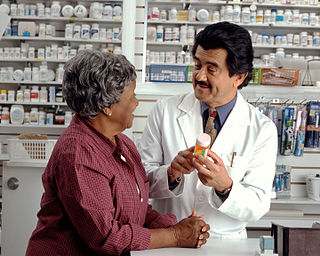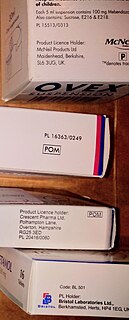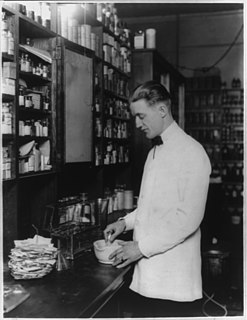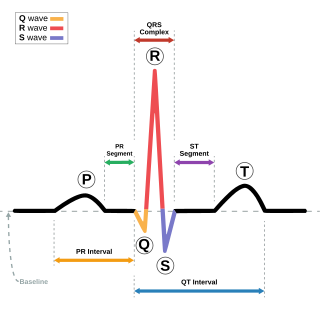
Pharmacists, also known as chemists or druggists, are health professionals who practice in pharmacy, the field of health sciences focusing on safe and effective medication use. Pharmacists undergo university-level education to understand the biochemical mechanisms and actions of drugs, drug uses, therapeutic roles, side effects, potential drug interactions, and monitoring parameters. This is mated to anatomy, physiology, and pathophysiology. Pharmacists interpret and communicate this specialized knowledge to patients, physicians, and other health care providers.

Pharmacy is the science and technique of preparing, dispensing, and review of drugs and providing additional clinical services. It is a health profession that links health sciences with pharmaceutical sciences and aims to ensure the safe, effective, and affordable use of drugs. The professional practice is becoming more clinically oriented as most of the drugs are now manufactured by pharmaceutical industries. Based on the setting, the pharmacy is classified as a community or institutional pharmacy. Providing direct patient care in the community of institutional pharmacies are considered clinical pharmacy.

A prescription is a health-care program implemented by a physician or other qualified health care practitioner in the form of instructions that govern the plan of care for an individual patient. The term often refers to a health care provider's written authorization for a patient to purchase a prescription drug from a pharmacist.

A prescription drug is a pharmaceutical drug that legally requires a medical prescription to be dispensed. In contrast, over-the-counter drugs can be obtained without a prescription. The reason for this difference in substance control is the potential scope of misuse, from drug abuse to practicing medicine without a license and without sufficient education. Different jurisdictions have different definitions of what constitutes a prescription drug.
The Pharmaceutical Benefits Scheme (PBS) is a program of the Australian Government that provides subsidised prescription drugs to residents of Australia, as well as certain foreign visitors covered by a Reciprocal Health Care Agreement. The PBS seeks to ensure that Australian residents have affordable and reliable access to a wide range of necessary medicines. The PBS has faced increased scrutiny as its cost has increased. The scheme assumes responsibility for the cost of drugs to patients in the community setting rather than while in hospital which is the responsibility of each state and territory. Together with Medicare the PBS is a key component of health care in Australia.
In medicine, compliance describes the degree to which a patient correctly follows medical advice. Most commonly, it refers to medication or drug compliance, but it can also apply to other situations such as medical device use, self care, self-directed exercises, or therapy sessions. Both patient and health-care provider affect compliance, and a positive physician-patient relationship is the most important factor in improving compliance, The cost of prescription medication also plays a major role.
An independent pharmacy is a retail pharmacy that is not directly affiliated with any chain of pharmacies and is not owned by a publicly traded company. Independent pharmacies are pharmacist-owned, privately held businesses in varying practice settings. They include single-store operations, pharmacist-owned multiple store locations, franchise, compounding, long-term care (LTC), specialty, and supermarket pharmacy operation. Independent pharmacy owners generally have high standards of customer service and strive to outperform chain pharmacy competitors.
An online pharmacy, Internet pharmacy, or mail-order pharmacy is a pharmacy that operates over the Internet and sends the orders to customers through the mail or shipping companies.

Pharmaceutical compounding is the creation of a particular pharmaceutical product to fit the unique need of a patient. To do this, compounding pharmacists combine or process appropriate ingredients using various tools. This may be done for medically necessary reasons, such as to change the form of the medication from a solid pill to a liquid, to avoid a non-essential ingredient that the patient is allergic to, or to obtain the exact dose(s) needed or deemed best of particular active pharmaceutical ingredient(s). It may also be done for more optional reasons, such as adding flavors to a medication or otherwise altering taste or texture. Compounding is most routine in the case of intravenous/parenteral medication, typically by hospital pharmacists, but is also offered by privately owned compounding pharmacies and certain retail pharmacies for various forms of medication. Whether routine or rare, intravenous or oral, etc., when a given drug product is made or modified to have characteristics that are specifically prescribed for an individual patient, it is known as "traditional" compounding.
Whalen v. Roe, 429 U.S. 589 (1977), was a case brought before the Supreme Court of the United States. The case involved a New York state law requiring reporting and storage of information concerning all Schedule II drug prescriptions. Physicians were required to report the name of the prescribing physician; the dispensing pharmacy; the drug and dosage; and the name, address, and age of the patient. This information was then stored by the New York Department of State.
In medicine, an indication is a valid reason to use a certain test, medication, procedure, or surgery. There can be multiple indications to use a procedure or medication. An indication can commonly be confused with the term diagnosis. A diagnosis is a particular [medical] condition while an indication is a reason for use. The opposite of an indication is a contraindication, a reason to withhold a certain medical treatment because the risks of treatment clearly outweigh the benefits.

Over-the-counter counseling refers to the counseling that a pharmacist may provide on the subject of initiating, modifying, or stopping an over-the-counter (OTC) drug product. OTC counseling requires an assessment of the patient's self-care concerns and drug-related needs. The types of drugs that are involved in OTC counseling are, for example, used to treat self-diagnosable conditions like heartburn, cough, and rashes, though prescription drugs and professional diagnoses are also relevant to the recommendation process.
In managed medical care step therapy is an approach to prescription intended to control the costs and risks posed by prescription drugs. The practice begins medication for a medical condition with the most cost-effective drug therapy and progresses to other more costly or risky therapies only if necessary. Also called step protocol or a fail first requirement, and is a type of prior authorization requirement.
Electronic prescribing is the computer-based electronic generation, transmission, and filling of a medical prescription, taking the place of paper and faxed prescriptions. E-prescribing allows a physician, pharmacist, nurse practitioner, or physician assistant to use digital prescription software to electronically transmit a new prescription or renewal authorization to a community or mail-order pharmacy. It outlines the ability to send error-free, accurate, and understandable prescriptions electronically from the healthcare provider to the pharmacy. E-prescribing is meant to reduce the risks associated with traditional prescription script writing. It is also one of the major reasons for the push for electronic medical records. By sharing medical prescription information, e-prescribing seeks to connect the patient's team of healthcare providers to facilitate knowledgeable decision making.

Remote dispensing is used in health care environments to describe the use of automated systems to dispense prescription medications without an on-site pharmacist. This practice is most common in long-term care facilities and correctional institutions that do not find it practical to operate a full-service in-house pharmacy.
KwikMed is an approved online pharmacy in the United States which has been granted regulatory approval to operate and sell medications online. Based in Salt Lake City, Utah, KwikMed's parent company, Phoenix Capital Management, is located in Scottsdale, Arizona. Specifically, KwikMed has been granted regulatory approval to prescribe medications for erectile dysfunction, male pattern hair loss and smoking cessation provided specific operating procedures are followed.
Electronic Prescriptions for Controlled Substances (EPCS) was originally a proposal for the DEA to revise its regulations to provide practitioners with the option of writing electronic prescriptions for controlled substances. These regulations would also permit pharmacies to receive, dispense, and archive these electronic prescriptions. These proposed regulations would be an addition to, not a replacement of, the existing rule.
Online doctor is a term that emerged during the 2000s, used by both the media and academics, to describe a generation of physicians and health practitioners who deliver healthcare, including drug prescription, over the internet.

Telepharmacy is the delivery of pharmaceutical care via telecommunications to patients in locations where they may not have direct contact with a pharmacist. It is an instance of the wider phenomenon of telemedicine, as implemented in the field of pharmacy. Telepharmacy services include drug therapy monitoring, patient counseling, prior authorization and refill authorization for prescription drugs, and monitoring of formulary compliance with the aid of teleconferencing or videoconferencing. Remote dispensing of medications by automated packaging and labeling systems can also be thought of as an instance of telepharmacy. Telepharmacy services can be delivered at retail pharmacy sites or through hospitals, nursing homes, or other medical care facilities.
Separation of prescribing and dispensing, also called dispensing separation, is a practice in medicine and pharmacy in which the physician who provides a medical prescription is independent from the pharmacist who provides the prescription drug.













